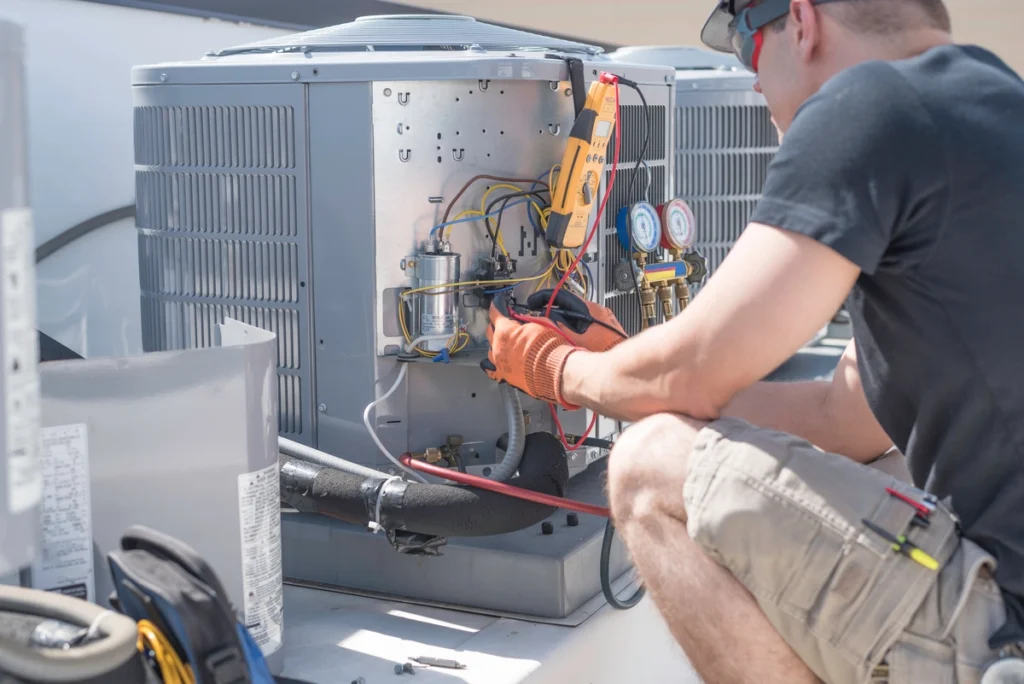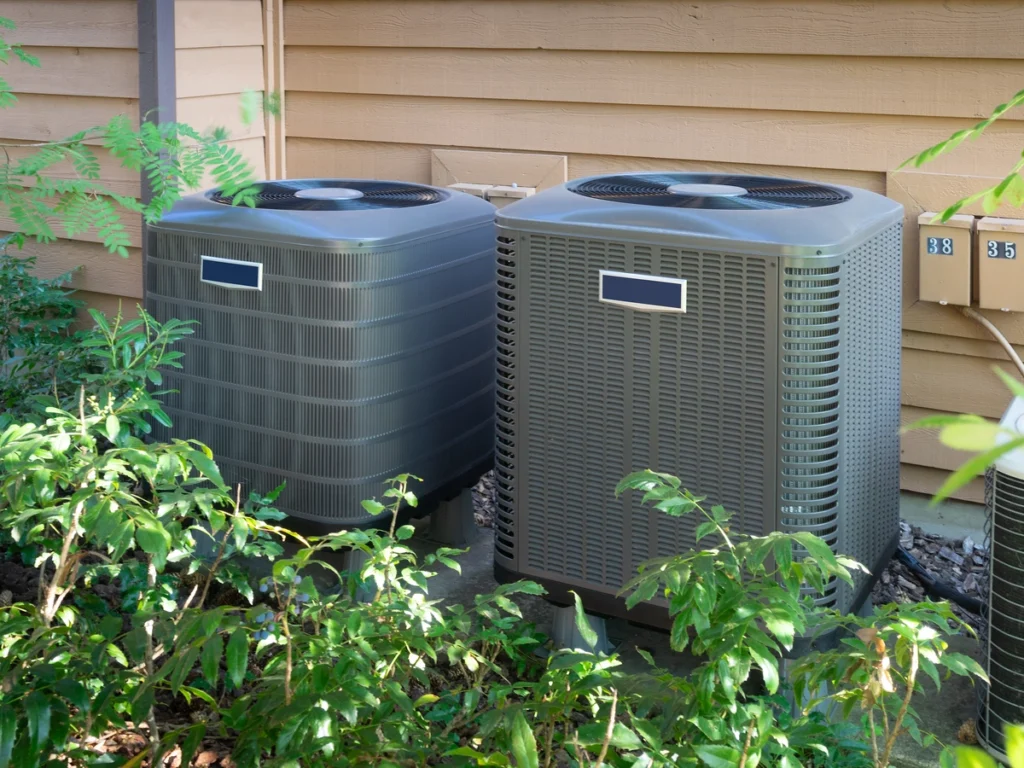As the temperatures rise and summer approaches, a functioning air conditioning system becomes indispensable for maintaining comfort and productivity in our homes and workplaces. However, there’s nothing more frustrating than turning on your AC only to find that it’s not blowing cold air.
In this expert guide, we’ll explore:
- The importance of a working AC
- The signs that indicate your AC isn’t functioning properly
- Common reasons why your AC might not be blowing cold air
- Steps to repair it
- The benefits of hiring a professional
- The potential costs involved
- When it might be time to consider replacing your AC unit
Stop Googling “AC not blowing cold air” and get the answers you need!
Importance of a Working AC
Air conditioning plays a crucial role in maintaining indoor comfort and quality of life, particularly during the hot summer months. Beyond just keeping us cool, a properly functioning AC system also helps to improve indoor air quality by filtering out:
- Pollutants
- Allergens
- Humidity
This not only enhances our comfort but also promotes better respiratory health and overall well-being. Furthermore, in certain environments, such as workplaces and healthcare facilities, a working AC system is essential for maintaining a conducive and productive environment.
Signs That Your AC Isn’t Working
Several signs can indicate that your AC system is not operating as it should:
- Warm Air: The most obvious sign is when the air coming from your vents is not cold or is only slightly cooler than the ambient temperature.
- Weak Airflow: If you notice weak or reduced airflow from the vents, it could indicate a problem with the blower motor or ductwork.
- Strange Noises: Unusual noises such as grinding, squealing, or banging could signal mechanical issues within the AC system.
- Frequent Cycling: If your AC frequently turns on and off, known as short cycling, it could be due to various issues such as a clogged filter, low refrigerant levels, or a malfunctioning thermostat.
- Moisture or Leaks: Any signs of moisture or water leaks around the AC unit could indicate a refrigerant leak or a clogged condensate drain.
Why Your AC Isn’t Blowing Cold Air: 6 Indicators
Several factors can contribute to your AC not blowing cold air:
1) Low Refrigerant Levels:
Refrigerant is essential for the cooling process, and low levels could be due to leaks or insufficient initial charging.
2) Dirty or Clogged Air Filter:
A dirty air filter restricts airflow, reducing the efficiency of your AC system and hindering its ability to cool effectively.
3) Faulty Compressor:
The compressor is responsible for circulating refrigerant and pressurizing it to facilitate heat exchange. Issues with the compressor can result in inadequate cooling.
4) Malfunctioning Thermostat:
A faulty thermostat can cause your AC to behave erratically or fail to reach the desired temperature.
5) Blocked Condenser Unit:
If the outdoor condenser unit is obstructed by debris, leaves, or vegetation, it can impair heat exchange and reduce cooling efficiency.
6) Damaged Ductwork:
Leaks or damage in the ductwork can lead to air loss, reducing the amount of cold air that reaches your living spaces.
How to Repair Your AC

While some AC issues can be resolved with simple DIY fixes, others may require professional intervention. Here are some steps you can take to troubleshoot and potentially repair your AC:
Check the Thermostat:
Ensure that the thermostat is set to the cooling mode and the desired temperature. Replace the batteries if necessary, and consider upgrading to a programmable thermostat for better control and energy efficiency.
Replace the Air Filter:
Check and replace the air filter if it’s dirty or clogged. A clean filter promotes better airflow and prevents dust and debris from accumulating in the system.
Clean the Condenser Unit:
Inspect the outdoor condenser unit and remove any debris or obstructions that may be blocking airflow. Use a hose to gently clean the fins and coils, taking care not to damage them.
Inspect the Ductwork:
Check for any visible signs of damage or leaks in the ductwork. Seal any gaps or holes with duct tape or mastic sealant to prevent air loss.
Check Refrigerant Levels:
If you suspect low refrigerant levels, contact a licensed HVAC technician to inspect for leaks and recharge the system with the appropriate refrigerant.
Test the Capacitor:
The capacitor provides the necessary voltage to start the compressor and fan motors. If the capacitor is faulty, it can cause the compressor or fan to malfunction. A multimeter can be used to test the capacitor for continuity.
Clean or Replace the Evaporator Coil:
Over time, the evaporator coil can become dirty or corroded, reducing its ability to absorb heat. Cleaning the coil with a mild detergent or replacing it may be necessary for optimal performance.
Why We Recommend Hiring a Professional
While DIY repairs may seem cost-effective, hiring a professional HVAC technician offers several advantages:
- Expertise and Experience: HVAC professionals undergo extensive training and certification to diagnose and repair complex AC issues accurately.
- Safety: Working with electrical components and refrigerants can be hazardous without proper knowledge and equipment. HVAC technicians have the necessary skills and safety protocols to handle these tasks safely.
- Time and Efficiency: Professionals have the tools and resources to diagnose and repair AC problems efficiently, minimizing downtime and inconvenience.
- Warranty Protection: Attempting DIY repairs or hiring unqualified individuals can void manufacturer warranties. Professional technicians ensure that repairs are conducted according to manufacturer specifications, preserving warranty coverage.
The Cost of AC Repair
The cost of AC repair can vary depending on the nature and extent of the issue, as well as factors such as labor rates and the cost of replacement parts. Here are some typical repair costs:
- Air Filter Replacement: $10-$20
- Capacitor Replacement: $100-$400
- Refrigerant Leak Repair: $200-$1,500
- Compressor Replacement: $1,500-$2,500
- Evaporator Coil Replacement: $600-$2,000
- Ductwork Repair: $200-$1,000
It’s essential to obtain multiple quotes from reputable HVAC companies and consider factors such as warranty coverage and service quality when selecting a contractor.
When It’s Time to Replace Your AC
While repairs can extend the lifespan of your AC system, there comes a point when replacement becomes the more cost-effective option. Consider replacing your AC unit if:
- It’s Over 10-15 Years Old: Older AC units are less energy-efficient and more prone to breakdowns. Replacing an outdated system with a newer, more efficient model can lead to significant energy savings.
- Frequent Repairs: If you find yourself repeatedly spending money on repairs, it may be more cost-effective to invest in a new AC unit that offers better reliability and performance.
- Rising Energy Bills: A sudden increase in energy bills could indicate that your AC system is struggling to operate efficiently. Upgrading to a high-efficiency unit can help reduce energy consumption and lower utility costs.
- Poor Performance: If your AC system consistently fails to keep your home cool and comfortable, despite repairs and maintenance, it may be time for an upgrade.
- Refrigerant Phase-Out: Older AC units that use R-22 refrigerant (Freon) are being phased out due to environmental concerns. Upgrading to a newer system that uses environmentally friendly refrigerants can ensure compliance with regulations and reduce long-term maintenance costs.
Air Conditioner Experts

A malfunctioning AC system can quickly turn a hot summer day into a sweltering ordeal. By understanding the importance of a working AC, recognizing the signs of trouble, and taking appropriate steps to repair or replace your system, you can ensure that your home or workplace remains cool, comfortable, and inviting throughout the summer months.Whether you opt for DIY repairs or enlist the help of a professional HVAC technician, investing in the maintenance and upkeep of your AC system is essential for your comfort and well-being. Contact Palmetto today to get the hope that you need!
